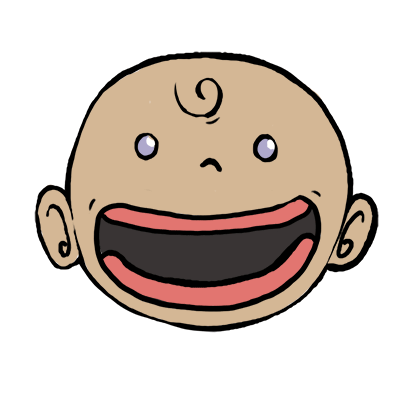Dr. V. Topouzov - Do you know?
Do you know when the "Baby Teeth" erupt?
Upper Teeth
Month
Lower Teeth
Month
Central - 8 - 12
Pateral - 9 - 13
Cuspid - 16 - 22
1st molar - 13 - 19
2nd molar - 25 - 33
Central - 6 - 10
Pateral - 10 - 16
Cuspid - 17 - 23
1st molar - 14 - 18
2nd molar - 23 - 31
Variations in the "schedule" are not unususal and sometimes, the eruption of the first Baby Teeth occur as early as 3 month of age, or, as late as one year.

Some facts about Primary Dentition, more commonly referred to as "Baby Teeth":
Baby Teeth are very important. Babies and young children need strong and healthy teeth to enable the chewing of solid food and to aid in proper speech development. These teeth also serve as space maintainers for the developing and later-erupting permanent "Adult Teeth".
Premature loss of Baby Teeth leads to crooked and malalinged Adult Teeth.
Your newborn: From birth, before the eruption of any teeth, the baby's gums should be cleaned with a soft, wet cloth and when the teeth start emerge - with a soft, wet brush - no toothpaste.
Pacifier use:
when a pacifier is utilized to comfort the baby, always remember two things:
1: Never clean the pacifier in your mouth (to avoid the transfer of bacteria).
2: Never dip the pacifier in a sweetener, such as honey, maple syrup, sugar, etc...
Thumbsucking should be discouraged by the age of four.
Teething:
This term commonly describes the erupltion of the Baby Teeth (see above). "Teething" can be uneventful, but many parents report various symptoms, such as fever*, rashes*, drooling, irritability and swollen gums. A cool cloth or teething ring can offer some relief. Pain relievers and desensitizing gels should only be used under advice of a doctor.
*Fever, rashes, and diarrhea, are not signs of teething and should be reported to the child's physician.
Bottle feeding:
1: Never permit the baby to fall asleep with the bottle in his/her mouth.
2: Never put sweetened liquids in the bottle. Use juice sparingly.
3: When the child gets older and takes a bottle to bed (if necessary), use only water.
Babies should be encouraged to drink from a cup, as they approach their 1st birthday. Parents should try to discontinue bottle feeding by 12-14 months of age.
Young Children:
By 3 years of age, children usually have all 20 of their Baby Teeth. Parents should have an active role in daily homecare. This should include:
-Brushing 2 times a day, after breakfast and before going to bed. During the night only water should be offered.
-Up until this age, a non-fluoridated toothpaste should be used. After the age of 3, a fluoridated toothpaste can be introduced (only if the child can "spit" after brushing).
-Flossing should be initiated by the parents, especially in the molar areas, where the contacts are usually tight.
Snacking:
Ideally, children should be limited to one snack between each meal. Water should be the drink of choice. Also, sticky sweet snacks should be avoided, as they stay in contact with the teeth for long periods of time.
Parents should examine the child's teeth regularly and make an appointment if they suspect something might be wrong. The first visit to a dental office should take place around the age of 3, even if everything appears normal.
We do encourage parents to bring the child earlier, if only to explore with them during this first appointment. Such early visits will ensure a positive first experience and set the tone for a comfortable dentist / patent relationship of a lifetime.



